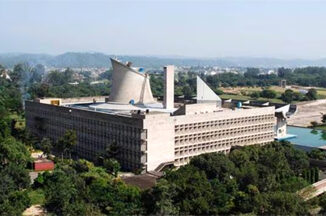Pakistan has used terrorism as an instrument of state policy towards India for three decades now. In the Mumbai attack six US nationals were killed by Pakistani state-sponsored terrorists, as the US well knows from, at least, David Headley’s confession. Yet, Obama applauded in the joint statement “Pakistan’s role as a key counterterrorism partner and recognised the sacrifices that Pakistani civilians, military, and law enforcement personnel have made over the years as they confront terrorism and militant groups”. He also “honored the sacrifices of the Pakistani security forces in Operation Zarb-e-Azb and other operations”. Pakistan, thus, got Obama’s fulsome endorsement for its anti-terrorist credentials. Naturally, India’s terrorist concerns vis a vis Pakistan found no expression, even indirectly. On the contrary, Obama and Sharif renewed “their common resolve to promote peace and stability throughout the region and to counter all forms of extremism and terrorism”. What is more, Obama made the suppression of extremism and militancy the responsibility of all South Asian countries, whereas it is Pakistan that is the fount of such forces. The joint statement affirms that “the stability of South Asia depended on cooperation among all neighbors to suppress all extremist and militant groups operating in the region”. One cannot but be bemused by such consideration being given to Pakistan on the terrorism front.
For Pakistan, the unresolved Kashmir issue justifies terrorist violence against India, which it conveniently ascribes to non-state actors angered by India’s brutal occupation of Kashmir. If Kashmir provided the political cover for Pakistan’s terrorism onslaught against India, it is all the more necessary for the US not to encourage Pakistan by pandering to its Kashmir fixation. The US well knows that all the principles that Pakistan invokes in justifying its stand on Kashmir are violated by it in internal governance and external action. Yet, the US is unable to shed its pro-Pakistan slant on Kashmir born out of Cold War politics. In 2013, during Nawaz Sharif‘s Washington visit, Obama supported a “sustained dialogue process between the two neighbors, aimed at building lasting peace in South Asia and resolving all outstanding territorial and other disputes through peaceful means”. Kashmir was not specifically highlighted. This time, to buttress Nawaz Sharif’s efforts to internationalise the Kashmir issue, Obama and Nawaz Sharif “emphasised the importance of a sustained and resilient dialogue process between the two neighbors aimed at resolving all outstanding territorial and other disputes, including Kashmir, through peaceful means”. The addition of the clause, “including Kashmir” is an unnecessary US provocation knowing India’s sensitivity and its position that the issue has to be dealt with bilaterally under the Simla Agreement. Calling it a “dispute” is also an endorsement of Pakistan’s position., when the word “issue” could have been used instead. Clearly, Pakistan insisted on calling it a “dispute” and the US was willing to oblige. Why highlight Kashmir in this manner? What does the US hope to gain from this in its dealings with India? On top of this, the joint statement repeats in other section the need for an “uninterrupted dialogue in support of peaceful resolution of all outstanding disputes”. Why “uninterrupted”?The unfortunate implication is that the US rejects the Indian line that dialogue and terror cannot go together.
Pakistan has now started leveling outlandish charges against India for supporting terrorism in its territory, whether in Balochistan, FATA or Karachi, and has dramatized this by delivering dossiers on Indian involvement to the UN Secretary General and the US. That the US should implicitly endorse this Pakistani propaganda is unfortunate. The joint statement emphasis the importance of “working together to address mutual concerns of India and Pakistan regarding terrorism”. In other words, the US recognizes that Pakistan has terrorism concerns that India should address. Why has all the rhetoric about making “the U.S.-India partnership a defining counterterrorism relationship for the 21st Century by deepening collaboration to combat the full spectrum of terrorist threats” vanished so quickly. In the post visit briefing, the anonymous US official was evasive on this point. Obama has also tilted in favor of the Pakistani position by expressing “concern over violence along the Line of Control” and supporting “confidence-building measures and effective mechanisms that are acceptable to both parties”. Once again, the US will not judge who is responsible for LOC violations, even if it is clear that this is part of the Pakistani strategy to infiltrate terrorists into India. As against this, in September, the US deprecated the Udhampur and Gurdaspur incidents in which Pakistani nationals were involved. This US policy of running with the hare and hunting with the hound when it comes to India and Pakistan does not pay dividends in building much-needed strategic trust between India and the US.
Our spokesman has rightly objected to Obama’s “support for Pakistan’s efforts to secure funding for the DiamerBhasha and Dasu dams” in Gilgit-Baltistan, which is under Pakistan’s illegal occupation. However, his positive reading of Nawaz Sharif’s so-called resolve to take action against the Lashkar-e-Tayyiba is puzzling, as the organization, as also its parent organization Jamaat ud Dawa, have been formally banned by Pakistan since many years but continue to operate with the support of the ISI. The manner in which Zaki-ur-Rahman Lakhvi’s bail case was dealt with by Pakistan with China‘s support in the UN Security Council involution of Security Council and FATF requirements earlier this year points to the bogus nature of any commitments on this score that Nawaz Sharif may make in a joint statement with the US.
All said and done, we have to live with the reality of US’s ambiguous policies towards India. However, even as we continue to engage the US in our own interest, which we must, we must remain clear-headed about the limitations of the relationship. If we cannot shape US policies to our liking, we must not allow our policies to be shaped to the advantage of the US in a one-sided manner.





186237 190167I agree with you. I wish I had your blogging style. 912830